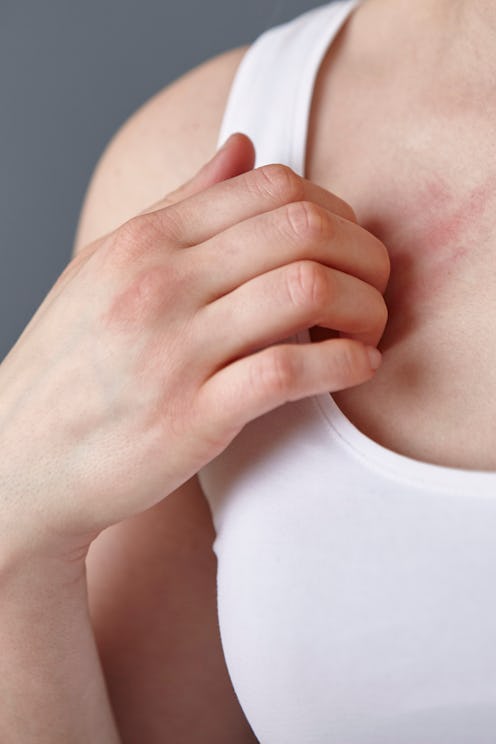Health
Doctors Explain Why You Get Hives When You’re Anxious
Anxious and itchy? What gives, body?

Your roommate is texting you nonstop about the dishes, your big presentation is due at 5 p.m., and not a single person has responded to your emails all day. That’s when you feel the familiar itch of a stress rash, complete with anxiety hives, stretch across your arms and chest.
Hives, otherwise known as urticaria, are itchy skin inflammations that flush red, either in big mottled patches or in small red dots. While they’re often associated with allergic reactions, experts tell Bustle you can also get hives from anxiety.
“Everyone's body responds to stress and anxiety differently,” Nira Shah LMFT RYT, a psychotherapist with mental health provider Alma, tells Bustle. When you’re stressed, she says, your immune system begins to go slightly haywire. Hives are part of your immune response; they happen when your body triggers mast cells to release a substance called histamine to deal with some kind of threat or infection. Histamine can expand the blood vessels in your skin and irritate your nerve endings, creating those telltale red, swollen patches.
Intense emotional stress can lead to chemical shifts within the body, Dr. Seema Sarin M.D., director of lifestyle medicine at medical provider EHE Health, tells Bustle. It’s clear that anxiety can trigger the immune system in many different ways, including weakening your immune protection so that it’s less effective over time. The mechanism that causes mast cells to release histamine when you’re having a really stressful time still isn’t understood, but there’s lots of evidence that anxiety can lead to hives pretty rapidly, within about 30 to 60 minutes.
Hives are one of a range of possible stress rashes. Some people might experience patches of redness without swelling or itchiness, for instance. They’re all due to the same chain reaction of histamine inflammation.
The American Stress Institute notes that the people who are most at risk for stress hives are women in their 30s and 40s who’ve had hives before for something else, like an allergic reaction. A case study published in Primary Care Companion For CNS Disorders in 2019 found that hives can be associated with panic attacks, and a 2021 study published in Archives of Dermatological Research noted that chronic, spontaneous hives are linked to both anxiety and depression. That may just mean that people with hives are more inclined to feel depression, though, not that depression can cause hives.
Hives may also be tied to something else — an allergic reaction to pollen, an irritant on your skin — and happen to crop up when you’re having an anxious time. If you’re experiencing hives, track what you’ve eaten and done lately; have you changed your laundry detergent, eaten a new food, or started a new medication? If nothing comes to mind, anxiety may well be at the root of the problem.
If you get anxiety hives, Dr. Sarin says, they’ll likely last a day or two but can be treated with antihistamines. “To prevent a repeat outbreak, you need to identify your triggers and try to avoid them,” she says. Explore things that can help you deal with your anxiety, like stress management techniques, relaxation practices, yoga, mindfulness, therapy, or exercise. And try your best not to scratch.
Experts:
Dr. Seema Sarin M.D.
Nira Shah LMFT RYT
Studies cited:
Shebak, S. S., Pinkston, J., & Ali, R. (2016). Rash Associated With Panic Attacks. The primary care companion for CNS disorders, 18(1), 10.4088/PCC.15l01822. https://doi.org/10.4088/PCC.15l01822
Tzur Bitan, D., Berzin, D., & Cohen, A. (2021). The association of chronic spontaneous urticaria (CSU) with anxiety and depression: a nationwide cohort study. Archives of dermatological research, 313(1), 33–39. https://doi.org/10.1007/s00403-020-02064-3
This article was originally published on